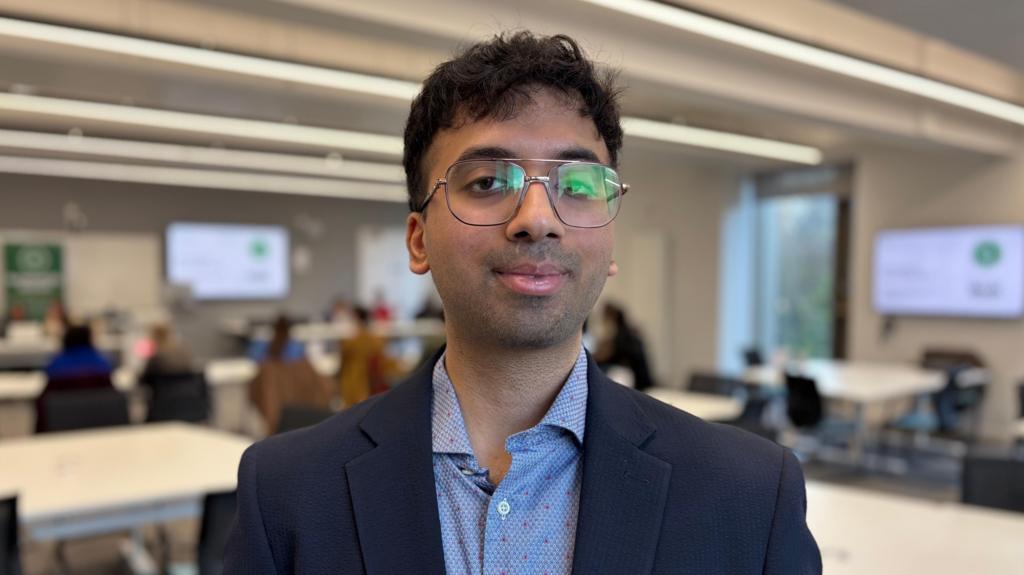“`html
As the COP30 climate change meeting in Brazil draws to a close, students at the University of Leicester convened their own climate discussions.
At the “Mock COP” conference held on Wednesday, students assumed the roles of various nations, delivering speeches and engaging in “negotiations” to forge international agreements.
Mohammed Siddiqui, an engineering PhD student and chair of the student union’s sustainability council, emphasized that the event allowed participants to experience the perspectives of global leaders.
“As our generation is poised to inherit the next era of decision-making and governance, we strive to ensure a planet that is sustainable not only for ourselves but also for future generations,” he stated.
Andrew Alvedro, a human geography student representing Spain, noted an “air of anxiety” among young people, coupled with “a sense of disillusionment.”
“When I mentioned to friends that I was attending such an event, their response was often, ‘What’s COP?’ – which is somewhat concerning,” he remarked.
“I believe that reflects a tendency for some to avoid acknowledging the issue.”
He expressed “cautious optimism” regarding progress in addressing climate change.
“We possess the scientific knowledge and the technology needed to tackle this crisis, yet instead of taking decisive action, we seem to be going around in circles,” he added.
“We need to resolve the political aspects, as the scientific understanding is already well-established.”
This year marks a decade since the landmark climate agreement at COP21 in Paris, where nations pledged to limit the rise in global temperatures to 1.5C.
However, UN Secretary General António Guterres has cautioned that “overshooting” 1.5C is now unavoidable, with the limit being breached in 2024 for the first time over an entire year.
Nour El Imane Boubekeur, a student of French and English law, represented her native France at the “Mock COP”.
“I’m feeling quite anxious, but I also maintain some hope in humanity,” she stated.
“We have demonstrated the capacity to achieve significant agreements like the Paris Agreement of 2015, so I remain hopeful that we are not entirely lost.”
“We can still enact changes, but those changes must be implemented immediately if we wish to avoid a disastrous future.”
James Charlton, a politics and international relations student and “Australian delegate,” echoed the sentiments of anxiety combined with hope.
“When we engage in discussions about the future, encompassing the next 20, 30, or 50 years, I find myself contemplating that this is my life, the world I will inhabit,” he expressed.
“There are countless individuals, both my age and younger, who are wholly committed to striving for a better future.”
Patrizia Szewernoha, an exchange student from Germany studying media and communications, explained that she chose to represent the United Kingdom to gain a deeper understanding of UK policies.
She expressed feeling “sad and disappointed” by the actions of certain world leaders.
Leading up to COP30, many nations failed to submit updated plans outlining strategies for reducing emissions of greenhouse gases.
“At times, it appears that they are delegating these problems to our generation, suggesting that they will not be affected,” Ms. Szewernoha noted.
Donald Trump did not participate in COP30, and the US government announced that it would not send any high-level representatives.
In a speech delivered at the UN in September, the US President characterized climate change as the “greatest con job ever perpetrated on the world”.
He also challenged the scientific evidence supporting rising temperatures.
The overwhelming consensus among scientists and experts affirms that climate change is human-caused and a verifiable reality.
COP30 officially concludes on Friday, November 21.
Follow BBC Leicester on Facebook, on X, or on Instagram. Send your story ideas to [email protected] or via WhatsApp on 0808 100 2210.
Nearly 200 countries attended COP30, which aimed to commit the world to take more action on climate change.
The annual climate conference was meant to finish on Friday but countries remain deeply divided.
A book has been created by a collaboration of photographers charting diminishing wildlife.
A row over fossil fuels has broken out at COP30 but this is also likely to be a negotiating tactic.
The fresh assessment was ordered after a successful legal challenge by environmental groups.
“`

